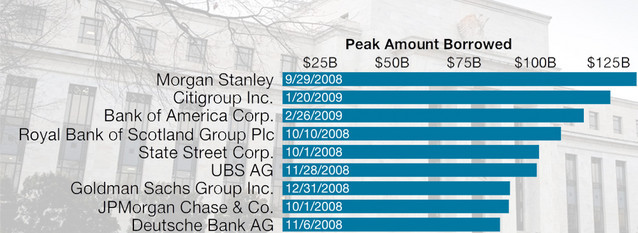
I continue to be of the mind that the Wall Street Bailouts were misguided, and that a massive Swedish style reorg would have been the best thing for the nation and the economy in the long run. Both Uncle Sam and the Fed would have provided the broad based debtor in possession financing required, and the losses would have fallen where they belonged — on the Shareholders and Bond Holders — and not the taxpayers.
The latest evidence of this: Data obtained by Bloomberg News through Freedom of Information Act requests, followed by months of litigation, and eventually, an act of Congress. (Wall Street Aristocracy Got $1.2T in Loans)
And the data ain’t pretty.
We knew that Citigroup (C), who borrowed $99.5 billion, and Bank of America (BAC), who took loans of $91.4 billion, were in trouble. I’ve been saying for the better part of 3 years now that they were, and likely still are mostly insolvent. But the surprise data point was Morgan Stanley (MS), got as much as $107.3 billion in loans, with no strings attached.
What should have happened?
Imagine if the government and the Federal Reserve were run not by knaves and fools and Wall Street sycophants, but instead, were run honestly for the benefit of the taxpaying voter. Imagine the goal was saving the banking system (not the banks), and the financial rescue was for the benefit of the taxpayers, not the bondholders. Naive thoughts, I totally understand, but hear me out.
A person who truly understood what had happened and why would have considered the following actions. Note these are not ideas come about with the benefit of hindsight, but what a small band of insightful people were saying at the time.
An honest broker of the situation would have:
1. Fire the senior management of the banks (see this)Instead, we bailed out the bondholders and management, choking off hope for a robust recovery. We are in fact slowly turning Japanese, awaiting the next recession (and the next and the next).
2. Banned all lobbying activity as a condition of any aid (see this)
3. Forced a Swedish style prepackaged bankruptcy (see this and this)
No comments:
Post a Comment